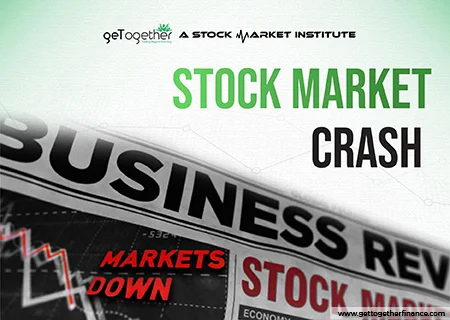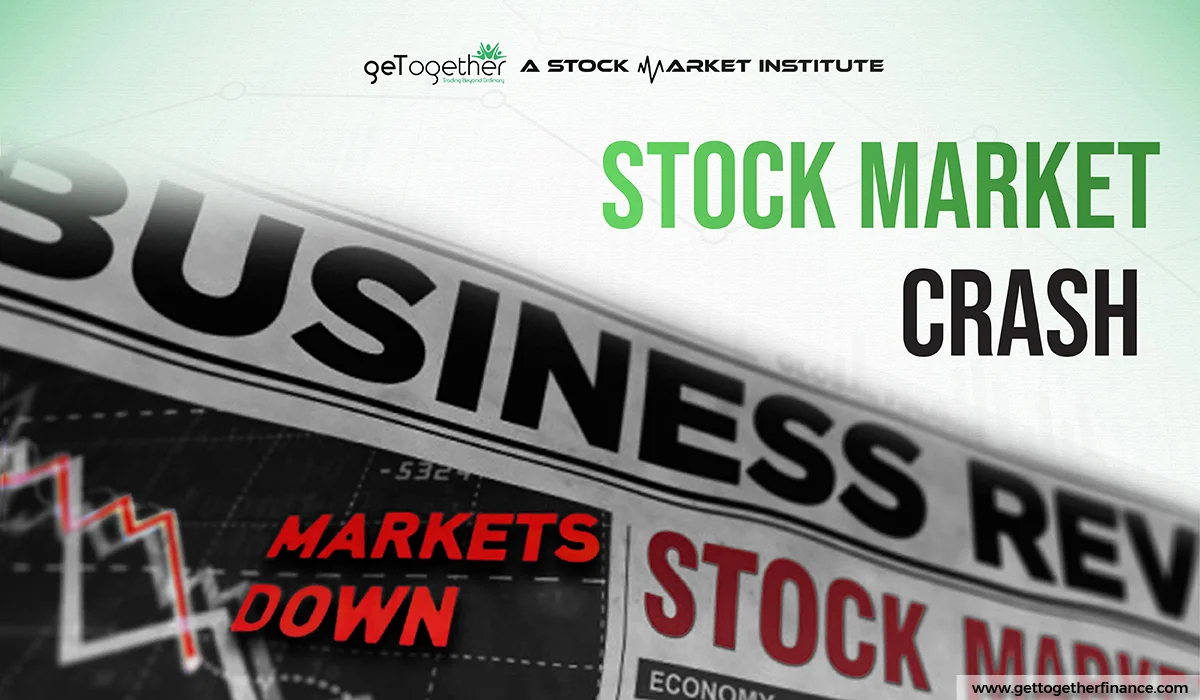STOCK MARKET CRASH- 4 Biggest Indian Crashes


Table of Contents
ToggleOverview
The stock market is a significant platform for money-making but what if, one day it crashes, what happens then? What exactly is meant by the Stock Market Crash?
A sudden and unpredictable drop in stock prices that leads to monetary loss is known as Stock Market Crash.
Introduction
A Stock Market crash can be a result of a big tragic event, economic distress, or disintegration of a long-time formed speculative bubble. The retailer’s panic selling can lead to repressing the stock prices further, playing the role of a contributor to the stock market crash. Although there is no definite ground for a stock market crash, it can leave a major impact on the economy.
Why Stock Market Crash?
When you look at it, there are a bunch of reasons which can influence a stock market crash, such as:-
Panic selling
The most common and major contributor to a crash. Investors, when fear that their investments are at risk of falling down, lead them to sell their shares in order to protect themselves from monetary loss; as prices of the stock begin to drop, fear spreads like wildfire ensuring more Panic selling.
One troubled step from the big institution of the market can induce panic selling in investors and can create huge no. In panic selling.
Natural or man-induced calamity
Anything which can cause harm and affect the country’s economy like a pandemic, war, or flood will cause a problem for the stock market and may lead to a crash also. For example, the recent pandemic-induced crash of Covid-19 in March 2020.
Economic Crisis
An economic crisis arises when a country faces a major downgrade in the economy due to its financial issues which leads to lower economic production(GDP), less availability of money, and frequent changes in prices which might go up and down because of inflation and deflation. An investor reacts quickly to any slight change in the market and in fear, tends to pull out the stocks at a slight inconvenience.
Speculation
While investing in any sector, investors will always hope for a rise in the value of their security in the future, a speculation that gives rise to a bubble of investors’ thoughts. Later when that speculation doesn’t meet with the result of reality, it bursts out loud leading to mass-sell off of the securities.
Also Read: Private and Public Sector Banks
Some famous Cases Of Stock Market Crashes
1992- Harshad Mehta Scam

1992 Indian stock market scam, disrupted the whole Indian stock market causing investors to lose approximately 5000 crores.
Mehta used market vulnerabilities and exploited loopholes which lead to inflation in stock prices by as much as 40 times their original value. Traders who benefited from this scam falsified information to get loans from the bank, which later came to light on 23 April 1992, because of the journalist Sucheta Dalal.
As she wrote a column in the Times Of India stating that Harshad Mehta used forged Bank Receipts to get unsecured loans and used various other small banks to issue Bank receipts on demand, once these receipts were issued, they were passed on to different banks and in return, banks gave money to Harshad Mehta under the impression of lending money against the government securities.
That money was used to raise the prices of the stocks in the market. Later the share was sold to the relevant party for a good amount of benefit and the due amount of money to the bank was returned. It went on for a good period of time without coming to the notice of anyone. When later on fraud got exposed it resulted in a market crash and left the banks with worthless debt in the millions.
Crash of 2008- Black Monday

In 2008 stock market witnessed several sharp drops in the BSE Sensex index.
A dramatic drop of 1,408 (8%) to 17,605 was seen on January 21 leading to a great loss of investors’ wealth, encouraging a temporary stop due to technical issues.
This phenomenon was named Black Monday as it featured numerous factors like global economic uncertainties, the horror of the U.S. recession, the reallocation of foreign funds from an emerging to a stable market, a decline in the interest rate, and a fragile market.
The trouble continued as Sensex dropped further on January 22 by 875 points (5%) and it continued till November. The last recorded drop was in October with a fall of 1070 points and landing on 8701. Overall, the stock market witnessed a wave of severe drops in prices, eating up investors’ confidence and creating chaos in the economy.
Crash of 2016- Demonetization

The Indian stock market experienced continuous decline in 2016 whereby February 16, BSE has already fallen by 26% in the time span of 11 months, seeing a loss of 1607 points in only 4 days. Indian Bank’s non-performing assets, global weaknesses, and numerous global factors like recession were stated as reasons for this fall. Foreign Institutional Investors(FIIs) sold securities worth crores (Rs 17,318) in consideration of China’s growth and dropping crude oil prices.
Furthermore, the stock market crashed by 1689 points on November 9, 2016, which was later said to be induced by the Indian government’s crackdown on black money, which created chaos and led to panic selling.
In the time span of demonetization ordered by PM MODI, Sensex dropped 6% to 26,902 and the Nifty fell by 541 points to 8002, leading to the weakening of the rupee. All the other Asian markets were experiencing the same fate as the Indian stock market like S and P index had declined by 4.45%.
Crash of 2020- Covid Pandemic

When the whole India was suffering through the pandemic, the Indian Stock market experienced a wave of depression, and the influence of COVID-19 was evidently visible on February 1 in representation of the FY 2020-21 union budget. The Market got badly shaken up in February when Sensex lost 1448 points and Nifty dropped by 432 points because of the increasing stress caused by the pandemic. The worst weekly fall was witnessed in late February since 2009 when both BSE and NSE experienced declines throughout the week.
On March 4 and 6, the market continued to get worse over time as it fell by approximately 1000 points each day. The declining wave continued for several days, reaching a maximum on March 23, when Sensex lost 3934.72 points (13.15%) and nifty dropped by 1135 points(12.98%) due to COVID-19 lockdowns and recession fears, as everything was shut down in the country by putting a stoppage on the economy. The lowest level recorded since 2016.
Phases of Recovery
One must ask this question: how long will it take to recover from a stock market crash?
Or would I be able to compensate for my loss? The answer is yes, and it has been time-tested that the market tends to have a habit of fast recovery. Like after the crash of 2008, nifty took approximately 8-10 months in going upward from approximately 2200 to 6000+.
Not only this, the recovery of 2016 was pretty fast, as nifty showed a hike in 5-6 months, From 6800 to 9000. If we discuss the crash of 2020, nifty recovered 4600-5000 Points in just mere 8 months and the rally confirmed to touch the milestone of 20,000 by mid 2023.
Stock Market Crash Can Be Avoided?
You can minimize the effects of the stock market crash on your investment. But how? By Diversifying your investment portfolio and investing in low-risk options, maintaining a strict STOP-LOSS order by following a proper risk management process, and by also keeping an eye on the signs of crash will help you in keeping your investment safe.
Conclusion
As we all know a stock market is a fragile place filled with profits and losses but keeping an eye out on patterns of the market for gains can lead to more profit than loss, because every past stock market downturn seems like a chance for gain, while every upcoming future crash appears to be a potential threat.
FAQs
Q. What is a stock market crash?
Ans: A stock market crash refers to the sudden and major decline in the prices of stocks or securities in the stock exchange.
Q. What are the factors involved in a stock market crash?
Ans: A stock market crash can be influenced by many reasons like economic crises, natural calamities like pandemics, floods, man-made calamities like war or geopolitical events, speculation, and panic selling.
Q. How does the stock market crash affect investors?
Ans: Investors who have invested in the stock market and hold some securities can experience some major financial loss during a crash. The value of the securities can fall straight away downwards leading to monetary loss.
CATEGORIES



 Facebook
Facebook Instagram
Instagram Youtube
Youtube
